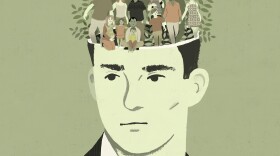
Rhaina Cohen
Rhaina Cohen is a producer and editor for NPR's Enterprise Storytelling unit, working across Embedded, Invisibilia, and Rough Translation.
Previously, she was a producer for Hidden Brain, where she brought together narrative journalism and social science research. Some of the most rewarding stories she worked on include those about why the #MeToo movement took off when it did, how American masculinity makes it harder for men to build close friendships and why we sometimes make decisions that baffle us. Cohen joined NPR as an intern for Planet Money.
She periodically writes for outlets such as The Atlantic, The Washington Post, and The New Republic. Her article about people who make a friend their life partner was selected by Longreads as one of the best articles of 2020. She received some of her earliest journalism training as a research assistant for authors. She worked on the New York Times bestselling book All The Single Ladies: Unmarried Women and the Rise of an Independent Nation and the biography Michelle Obama: A Life.
Cohen was a Marshall Scholar at Oxford, where she earned a master's in comparative social policy (and while there, competed in a dance style that hasn't yet taken off in the United States: acrobatic rock 'n' roll). She holds a bachelor's degree in American Studies from Northwestern University. As a 2018 FASPE fellow, she studied journalism ethics in Germany and Poland.
-
So often we get stuck in the past, rehashing what we should have done, and what we no longer have. But researchers say our obsession with the past can tell us something important about our future.
-
Many parents think they can shape their child into a particular kind of adult. Psychologist Alison Gopnik says the science suggests otherwise.
-
All of us think back to turning points in our lives, and imagine how things could have unfolded differently. Why do we so often ask ourselves, "What if?"
-
Violent crimes committed by Muslims are much more likely to be reported as "terrorism." And that has disturbing consequences for the way Muslims are perceived.
-
Economic theory rests on a simple notion about humans: people are rational. But a half century ago, two psychologists shattered these assumptions.
-
A culture of racism can infect us all. On this week's radio show, we discuss the implicit biases we carry that have been forged by the society around us.
-
Women in the Middle Ages were excluded from many realms: the law, universities, and surprisingly, from friendship. Clearly, that's changed — and Kayleen Schaefer's new book examines how and why.
-
It can seem arbitrary the way certain people fascinate us. But researcher Elizabeth Currid-Halkett says celebrity has a formula. So does being part of any social group — perhaps even your own.
-
Is nostalgia an emotion that's bitter, or sweet? Psychologist Clay Routledge explains what causes us to feel nostalgic and how nostalgia affects us.
-
When Jessica and Royce James learned that they were going to have a daughter, they decided to raise her in as gender-neutral a way as possible. It was harder than they could have imagined.









